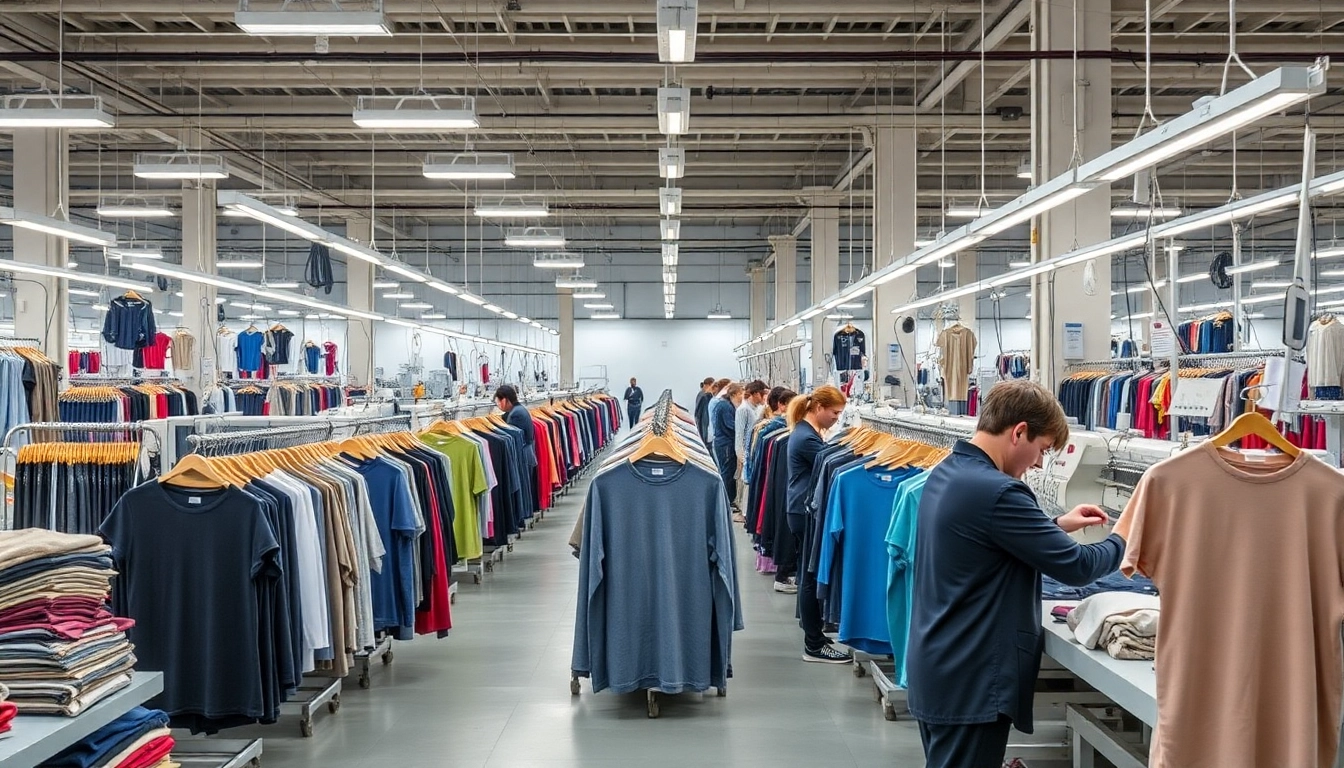Understanding the Role of Clothing Manufacturers in the Fashion Industry
In an increasingly globalized and competitive fashion landscape, clothing manufacturers serve as the backbone of apparel production. They transform innovative designs and visions into tangible products that reach consumers worldwide. Whether operating locally or internationally, these manufacturers play a pivotal role in shaping brand identity, quality standards, and market responsiveness. For entrepreneurs and established brands alike, understanding the nuances of clothing manufacturing is essential to achieving operational excellence and market success. To explore this critical industry component, we delve into what defines clothing manufacturers, their impact on brand success, and how to select and collaborate with the right manufacturing partners.
For those embarking on a fashion journey, it’s imperative to recognize that sourcing from dependable Clothing Manufacturers can significantly influence product quality, timelines, and overall profitability. This comprehensive guide offers insights into the key factors that distinguish top-tier manufacturers and practical strategies for cultivating successful manufacturing partnerships.
Understanding the Role of Clothing Manufacturers in the Fashion Industry
Definition and Scope of Clothing Manufacturing
Clothing manufacturing encompasses the entire process of producing apparel—from fabric sourcing and pattern design to cutting, sewing, finishing, and packaging. It involves various stages, often supported by specialized facilities and skilled labor. The scope varies widely, ranging from small boutique ateliers to large-scale industrial factories capable of mass-producing millions of units. Manufacturers may cater to diverse segments such as streetwear, luxury fashion, sportswear, or basic casual wear, each demanding specific expertise and quality standards.
In the modern era, especially with the rise of fast fashion and e-commerce, manufacturing capabilities have expanded to include advanced technological interventions like automation, computer-aided design (CAD), and 3D prototyping. This evolution allows brands to respond swiftly to market trends, customize products, and reduce lead times, all while maintaining stringent quality controls.
Key Factors Distinguishing Leading Clothing Manufacturers
Leading manufacturers are characterized by several critical attributes:
- Quality and Consistency: Consistently producing high-quality garments that meet specifications and durability standards.
- Flexibility and Scalability: Ability to handle varying order sizes, from small batches to large-volume production.
- Technological Capabilities: Integration of advanced machinery and software to enhance precision and efficiency.
- Compliance and Ethical Standards: Adherence to labor laws, environmental regulations, and ethical sourcing practices.
- Cost Competitiveness: Offering competitive pricing without compromising on quality or ethical standards.
How Clothing Manufacturers Impact Brand Success
Manufacturers directly influence a brand’s reputation through the quality, consistency, and timeliness of product delivery. A reliable manufacturer ensures that production aligns with the brand’s vision, maintains quality standards, and adheres to schedules—crucial factors that enhance customer satisfaction and loyalty.
Moreover, innovative manufacturers can introduce new fabrics, construction techniques, and sustainable practices that differentiate a brand. By collaborating closely, brands can leverage manufacturers’ expertise to optimize design, reduce costs, and speed time-to-market, ultimately gaining a competitive edge.
Choosing the Right Clothing Manufacturer for Your Business Needs
Evaluating Manufacturing Capabilities and Expertise
Start by assessing a manufacturer’s extensive capabilities—do they specialize in your product niche? For example, if your focus is on eco-friendly or technical sportswear, seek manufacturers with proven experience in those areas. Review their machinery, workforce expertise, and production capacity. Request samples and case studies to evaluate quality and readiness for your specifications.
Essential Criteria for Quality Assurance and Compliance
Ensure the manufacturer maintains rigorous quality assurance protocols, such as ISO certifications, and complies with local and international labor laws. Verify their adherence to safety standards and environmental policies, especially if sustainability is a priority for your brand. Visiting the factory or requesting third-party audits can add an extra layer of confidence.
Building a Strong Partnership with Clothing Manufacturers
Effective communication, transparency, and trust lay the foundation for a successful long-term partnership. Clearly articulate your expectations, design specifications, and production timelines upfront. Establish regular check-ins, milestones, and quality control procedures. Additionally, foster mutual understanding regarding costs, lead times, and flexibility to adapt to market shifts.
Best Practices for Working with Clothing Manufacturers
Design Collaboration and Communicative Processes
Collaborate early in the design phase to ensure manufacturability. Share detailed tech packs, fabric choices, and sample feedback. Use visual aids like 3D renderings or prototypes for better clarity. Open channels of communication reduce errors, streamline revisions, and foster innovation.
Managing Production Timelines and Quality Control
Develop a production schedule with buffer periods for unforeseen delays. Implement robust quality control checkpoints during manufacturing. Conduct pre-shipment inspections and utilize third-party quality assurance services if possible. This proactive approach minimizes defects and ensures consistency.
Cost Optimization and Supply Chain Management
Negotiate clear pricing structures and explore options like bulk purchasing, long-term contracts, or shared logistics to reduce costs. Maintain visibility into the supply chain to identify bottlenecks or inefficiencies. Diversify suppliers when possible to mitigate risks associated with geopolitical or environmental disruptions.
Emerging Trends Influencing Clothing Manufacturers Today
Sustainable Manufacturing and Eco-Friendly Fabrics
With increasing consumer demand for sustainable products, manufacturers are adopting eco-friendly fabrics like organic cotton, Tencel, and recycled polyester. Green manufacturing practices include waste reduction, water conservation, and renewable energy use. Brands partnering with these manufacturers demonstrate environmental responsibility, enhancing brand image and compliance with future regulations.
Technological Advancements in Apparel Production
Automation, AI-driven quality checks, and 3D sampling are transforming manufacturing processes. These technologies reduce waste, enhance precision, and accelerate timelines. For example, digital printing allows for small batch customizations with minimal lead time, catering to the growing demand for personalized products.
Customization and Private Label Opportunities
Today’s manufacturers offer flexible private label services, enabling brands to create unique collections with low minimum order quantities (MOQs). Customization options include fabric blends, cuts, embellishments, and branding elements, empowering brands to differentiate themselves and cater to niche markets effectively.
Measuring Success: Metrics for Evaluating Clothing Manufacturers
Quality Metrics and Product Consistency
Assess defect rates, fabric durability, and adherence to design specifications. Consistent quality signifies stable processes and skilled craftsmanship, impacting customer satisfaction and return rates.
Lead Time and Delivery Performance
Track on-time delivery percentages and production cycle durations. Reliable manufacturers help brands respond swiftly to market trends, avoid stockouts, and maintain competitiveness.
Customer Satisfaction and Brand Growth
Gather feedback from end customers regarding product quality and delivery. Metrics such as repeat orders, customer reviews, and market share growth serve as indicators of a successful manufacturing partnership.




